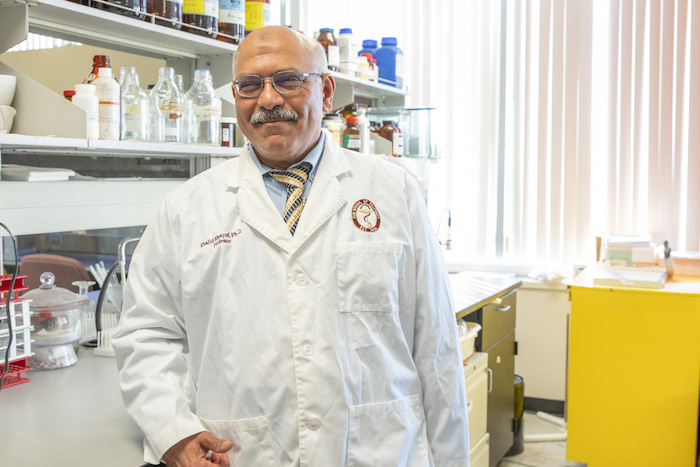

University of Louisiana Monroe College of Pharmacy Professor Dr. Khalid El Sayed is studying an extract from a fungus that shows potential in treating prostate cancer recurrence. The National Institutes of Health has funded El Sayed’s research for two years at more than $347,000.
Siddarth Gaulee/ULM Photo Services
By Mark Henderson
Special to the University of Louisiana Monroe
Researchers at the University of Louisiana Monroe are cooking up what they hope will be a novel approach to fighting prostate cancer.
They ferment a fungus in a flask, extracting an odd-colored liquid. Through a series of steps, they separate the target compound in test tubes, and each time the liquid becomes clearer.
The goal: to get the purest form of pseurotin A, a natural product in the fungus, possible.
The work is tedious and expensive.
A new grant awarded to the ULM College of Pharmacy will help fund the research into the potential use of pseurotin A to fight recurring prostate cancer.
The National Institutes of Health approved a grant application by Dr. Khalid El Sayed, Professor of Medicinal and Natural Products Chemistry in the School of Basic Pharmaceutical and Toxicological Sciences in the College of Pharmacy.
The two-year grant provides $182,419 for year one and $164,794 for year two.
Improving survival rates of recurring prostate cancer
Among American men, prostate cancer is the most common cancer and the second-highest cause of death. About one in nine men will be diagnosed with prostate cancer, and one in 41 men will die.
El Sayed says standard treatment involves surgery, radiation, followed by chemotherapy.
However, prostate cancer is particularly aggressive and often recurs, and researchers have limited preventive options. Patients who suffer a cancer recurrence have only a 29 percent chance of surviving.
“It’s hard to design a recurrence deterrence because the recurrence mechanism is not fully understood,” El Sayed said. “Numerous patients die from the chemical in the chemotherapy used to treat tumors.”
NIH backs research potential
To do the research in ULM labs, El Sayed acquired a supply of fungus that produces pseurotin A.
El Sayed and his research team invented a new cancer recurrence model treating lab mice with pseurotin A. The success is such that El Sayed applied for the grant money to continue the research.
El Sayed said of all the grants NIH received in this cycle, the agency views this as one of the most important in terms of practical implementation and expected outcomes.
He doesn’t expect to see this research project applied in clinical practice for at least five years.
“We have intense research to do before reaching the application to humans,” he said.
If the research continues to show promise, follow-up grants through the NIH are possible.
“Every project is very expensive,” El Sayed said. “My job is to secure more funding to continue quality natural products research at ULM.”